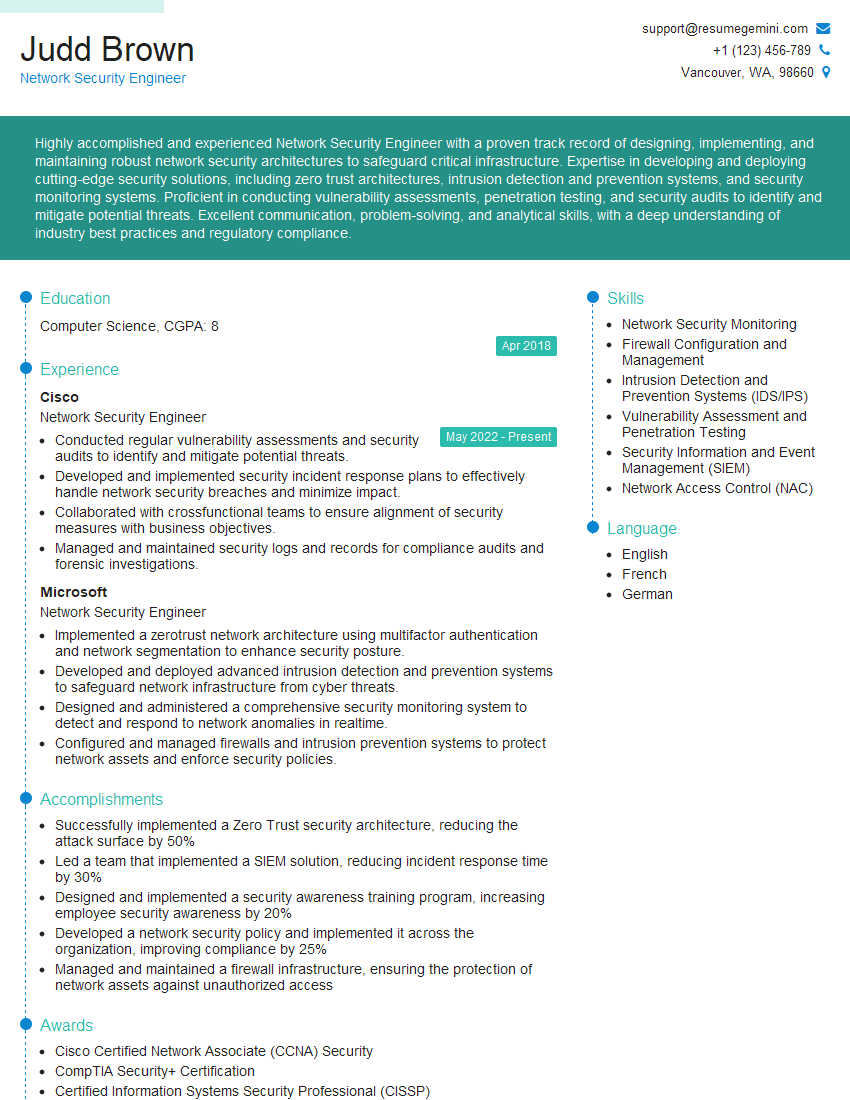Are you a seasoned Network Security Engineer seeking a new career path? Discover our professionally built Network Security Engineer Resume Template. This time-saving tool provides a solid foundation for your job search. Simply click “Edit Resume” to customize it with your unique experiences and achievements. Customize fonts and colors to match your personal style and increase your chances of landing your dream job. Explore more Resume Templates for additional options.

Judd Brown
Network Security Engineer
Summary
Highly accomplished and experienced Network Security Engineer with a proven track record of designing, implementing, and maintaining robust network security architectures to safeguard critical infrastructure. Expertise in developing and deploying cutting-edge security solutions, including zero trust architectures, intrusion detection and prevention systems, and security monitoring systems. Proficient in conducting vulnerability assessments, penetration testing, and security audits to identify and mitigate potential threats. Excellent communication, problem-solving, and analytical skills, with a deep understanding of industry best practices and regulatory compliance.
Education
Computer Science
April 2018
Skills
- Network Security Monitoring
- Firewall Configuration and Management
- Intrusion Detection and Prevention Systems (IDS/IPS)
- Vulnerability Assessment and Penetration Testing
- Security Information and Event Management (SIEM)
- Network Access Control (NAC)
Work Experience
Network Security Engineer
- Conducted regular vulnerability assessments and security audits to identify and mitigate potential threats.
- Developed and implemented security incident response plans to effectively handle network security breaches and minimize impact.
- Collaborated with crossfunctional teams to ensure alignment of security measures with business objectives.
- Managed and maintained security logs and records for compliance audits and forensic investigations.
Network Security Engineer
- Implemented a zerotrust network architecture using multifactor authentication and network segmentation to enhance security posture.
- Developed and deployed advanced intrusion detection and prevention systems to safeguard network infrastructure from cyber threats.
- Designed and administered a comprehensive security monitoring system to detect and respond to network anomalies in realtime.
- Configured and managed firewalls and intrusion prevention systems to protect network assets and enforce security policies.
Accomplishments
- Successfully implemented a Zero Trust security architecture, reducing the attack surface by 50%
- Led a team that implemented a SIEM solution, reducing incident response time by 30%
- Designed and implemented a security awareness training program, increasing employee security awareness by 20%
- Developed a network security policy and implemented it across the organization, improving compliance by 25%
- Managed and maintained a firewall infrastructure, ensuring the protection of network assets against unauthorized access
Awards
- Cisco Certified Network Associate (CCNA) Security
- CompTIA Security+ Certification
- Certified Information Systems Security Professional (CISSP)
- Certified Ethical Hacker (CEH)
Certificates
- Certified Information Systems Security Professional (CISSP)
- Certified Ethical Hacker (CEH)
- Security+ Certification
- Certified Information Security Manager (CISM)
Career Expert Tips:
- Select the ideal resume template to showcase your professional experience effectively.
- Master the art of resume writing to highlight your unique qualifications and achievements.
- Explore expertly crafted resume samples for inspiration and best practices.
- Build your best resume for free this new year with ResumeGemini. Enjoy exclusive discounts on ATS optimized resume templates.
How To Write Resume For Network Security Engineer
- Highlight your technical skills and experience in implementing and managing network security technologies.
- Quantify your accomplishments with specific metrics and results whenever possible.
- Tailor your resume to the specific job description and company you are applying to.
- Proofread your resume carefully for any errors or inconsistencies.
Essential Experience Highlights for a Strong Network Security Engineer Resume
- Implemented a zero trust network architecture using multifactor authentication and network segmentation to enhance security posture.
- Developed and deployed advanced intrusion detection and prevention systems to safeguard network infrastructure from cyber threats.
- Designed and administered a comprehensive security monitoring system to detect and respond to network anomalies in real-time.
- Configured and managed firewalls and intrusion prevention systems to protect network assets and enforce security policies.
- Conducted regular vulnerability assessments and security audits to identify and mitigate potential threats.
- Developed and implemented security incident response plans to effectively handle network security breaches and minimize impact.
Frequently Asked Questions (FAQ’s) For Network Security Engineer
What are the key skills required for a Network Security Engineer?
Network security engineers need a strong understanding of network security principles, technologies, and best practices. They should also be proficient in implementing and managing a variety of network security solutions, including firewalls, intrusion detection and prevention systems, and security monitoring systems.
What are the career prospects for Network Security Engineers?
Network security engineers are in high demand due to the increasing need for organizations to protect their networks from cyber threats. The job outlook for network security engineers is expected to grow much faster than average in the coming years.
What are the typical responsibilities of a Network Security Engineer?
Network security engineers are responsible for designing, implementing, and maintaining network security architectures. They also monitor network traffic for suspicious activity, investigate security incidents, and develop security policies and procedures.
What are the educational requirements for becoming a Network Security Engineer?
Most network security engineers have a bachelor’s degree in computer science or a related field. Some employers may also require certification in network security or a related field.
What are the soft skills required for a Network Security Engineer?
Network security engineers need strong communication, problem-solving, and analytical skills. They should also be able to work independently and as part of a team.